Related Research Articles
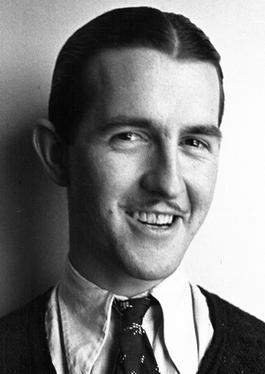
Robert Porter McKimson Sr. was an American animator and illustrator, best known for his work on the Looney Tunes and Merrie Melodies series of cartoons from Warner Bros. Cartoons and later DePatie–Freleng Enterprises. He wrote and directed many animated cartoon shorts starring Bugs Bunny, Daffy Duck, Porky Pig, Foghorn Leghorn, Hippety Hopper, Speedy Gonzales, and the Tasmanian Devil, among other characters. He also developed Bugs Bunny's design in the 1943 short Tortoise Wins by a Hare.

Hippety Hopper is a young kangaroo character in the Warner Bros. Looney Tunes series of cartoons. Robert McKimson introduced Hippety Hopper in Hop, Look and Listen (1948), which established the pattern for future Hippety Hopper cartoons. The character appeared in 14 theatrical cartoons between 1948 and 1964.

Tweetie Pie is a 1947 Warner Bros. Merrie Melodies cartoon directed by Friz Freleng. The short was released on May 3, 1947, and stars Tweety with Sylvester, who is called "Thomas" in this cartoon.
Warner Bros. Cartoons, Inc. was an American animation studio, serving as the in-house animation division of Warner Bros. during the Golden Age of American animation. One of the most successful animation studios in American media history, it was primarily responsible for the Looney Tunes and Merrie Melodies series of animated short films. The characters featured in these cartoons, including Bugs Bunny, Daffy Duck, and Porky Pig, are among the most famous and recognizable characters in the world. Many of the creative staff members at the studio, including directors and animators such as Chuck Jones, Friz Freleng, Robert McKimson, Tex Avery, Robert Clampett, Arthur Davis, and Frank Tashlin, are considered major figures in the art and history of traditional animation.

Acrobatty Bunny is a 1946 Warner Bros. Looney Tunes short directed by Robert McKimson. The short was released on June 29, 1946, and stars Bugs Bunny and Nero the Lion. This was the first cartoon McKimson directed that starred Bugs Bunny.

Daffy Duck Slept Here is a 1948 Warner Bros. Merrie Melodies cartoon, directed by Robert McKimson. The cartoon was released on March 6, 1948, and stars Porky Pig and Daffy Duck.
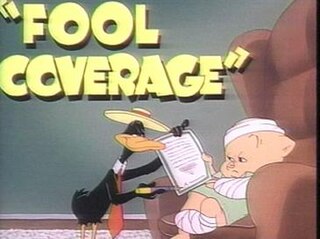
Fool Coverage is a 1952 Warner Bros. Looney Tunes cartoon directed by Robert McKimson. The cartoon was released on December 13, 1952, and stars Daffy Duck and Porky Pig.
Strife with Father is a Warner Bros. Merrie Melodies animated film directed by Robert McKimson and starring voice actor Mel Blanc. It was produced in 1948 and released in 1950. This is the fourth and final cartoon to feature Beaky Buzzard.
Daffy Doodles is a 1946 Warner Bros. Looney Tunes cartoon directed by Bob McKimson. It was released on April 6, 1946, and stars Daffy Duck and Porky Pig.

A Horse Fly Fleas is a 1947 Warner Bros. Looney Tunes cartoon short. It was written by Warren Foster and directed by Robert McKimson. The short was released on December 13, 1947.
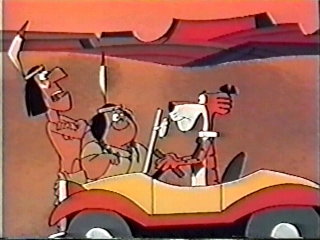
Injun Trouble is a 1969 Merrie Melodies cartoon, directed by Robert McKimson. The cartoon was released on September 20, 1969, and features Cool Cat. It is noted for being the last cartoon in the original Merrie Melodies series, ending a run that had continued since 1931, as well as the whole original Looney Tunes/Merrie Melodies series from 1930-1969. Additionally, this was the 1,000th cartoon short released by Warner Bros.
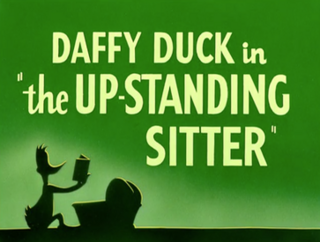
The Up-Standing Sitter is a 1948 Warner Bros. Looney Tunes cartoon, directed by Robert McKimson. The cartoon was released on July 3, 1948, and stars Daffy Duck. All voices are by Mel Blanc.
Cheese It, the Cat! is a 1957 Warner Bros. Looney Tunes cartoon, directed by Robert McKimson. The short was released on May 4, 1957, and is the second of three McKimson cartoons parodying television's The Honeymooners.

One Meat Brawl is a 1947 Warner Bros. Merrie Melodies cartoon directed by Robert McKimson. The short stars Porky Pig and Barnyard Dawg, and was released on January 18, 1947. The title is a takeoff on the popular song "One Meat Ball".
This is a listing of all the animated shorts released by Warner Bros. under the Looney Tunes and Merrie Melodies banners between 1960 and 1969. A total of 147 shorts were released during the 1960s.

Bugged by a Bee is a 1969 Warner Bros. Looney Tunes animated cartoon directed by Robert McKimson. It starred Cool Cat, and was the final cartoon from the original Looney Tunes/Merrie Melodies series to bear the Looney Tunes name, and the last from that era to be widely released. One more cartoon, Injun Trouble, would follow Bugged by a Bee, but it was in the Merrie Melodies series.
Feather Bluster is a 1958 Warner Bros. Merrie Melodies animated short directed by Robert McKimson. The cartoon was released on May 10, 1958, and features Foghorn Leghorn and the Barnyard Dawg.

Gone Batty is a 1954 Warner Bros. Looney Tunes animated cartoon short directed by Bob McKimson.
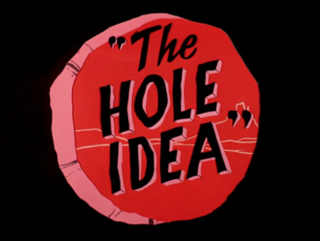
The Hole Idea is a 1955 Warner Bros. Looney Tunes cartoon directed and animated by Robert McKimson with character layout and background layout and paint by Richard H. Thomas. The short was released on April 16, 1955.
References
- 1 2 3 4 5 Webb, Graham (2011). The Animated Film Encyclopedia: A Complete Guide to American Shorts, Features and Sequences (1900-1999). McFarland & Company, Inc. p. 162. ISBN 978-0-7864-4985-9.
- ↑ Beck, Jerry; Friedwald, Will (1989). Looney Tunes and Merrie Melodies: A Complete Illustrated Guide to the Warner Bros. Cartoons. Henry Holt and Co. p. 175. ISBN 0-8050-0894-2.
- ↑ Lenburg, Jeff (1999). The Encyclopedia of Animated Cartoons. Checkmark Books. pp. 104–106. ISBN 0-8160-3831-7 . Retrieved 6 June 2020.